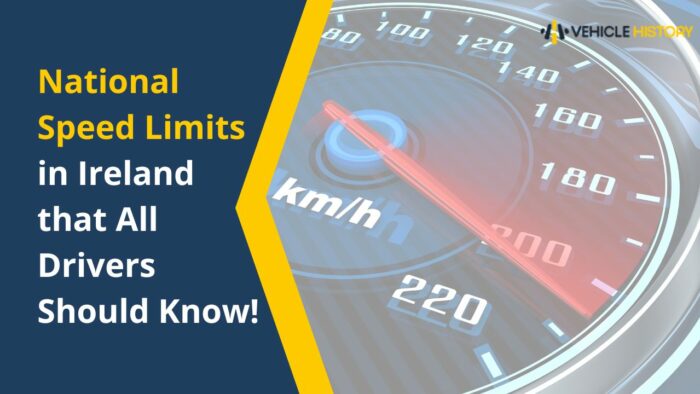In Ireland, the Department of Transport is responsible for setting the speed limits. Different countries have varying speed limits, and if it’s your first time coming to Ireland or you’re just learning to drive—a novice driver—it is crucial that you’re aware of the national speed limits allowable on Irish roads.
Speed limits are the maximum speed you can drive when it is safe. Road signage usually tells you the speed limit you’re allowed to drive on that road.
Additionally, you need to take responsibility for your driving and adjust your speed based on factors including weather conditions, traffic, vehicle conditions, driving experience, visibility, and any unforeseen changes on the road.
Having gotten that, we will discuss everything you need to know about the various types of speed limits in Ireland, the speed limits for different road types, the motorway rules, and the fines for breaking the speeding limit law in Ireland.
Types of Speed Limits in Ireland
We have a total of five types of speed limits in Ireland, and they are discussed below:
National Road Speed Limits
The speed limit is 100kph on all national roads, including the carriageways.
Motorway Speed Limits
The speed limit is 120kph (kilometres per hour). On the Irish motorways, novice drivers, vehicles below 50cc, pedestrians, animals, and bicycles are prohibited. Novice drivers are those who have had their first learner permit for less than two years.
Regional and Local Road Speed Limits
The speed limit is 80kph on all regional and local roads. The latter is sometimes called non-national roads.
Town and City Speed Limits
The speed limit is 50kph for developed or built-up areas.
Special Speed Limits
Generally, the speed limit is 30kph or 60kph. The limits are applied to roads around schools or outside built-up areas.
Below is a table showing the speed limits for different Road types in Ireland
| Road Type | Speed Limit |
| Motorway | 120kph (74mph) |
| National roads | 100kph (62mph) |
| Non-national roads | 80kph (49mph) |
| Roads within cities and towns | 50kph (31mph) |
| Roads for densely populated areas (special speed limits) | 30kph (18mph) |
Different types of vehicles also have differing speed limits. If a vehicle tows a caravan or trailer, the speed limit should not exceed 80kph, regardless of the road type – including motorways and national roads.
Speeding Fines in Ireland
Driving over the speed limit is punishable under Irish law.If you’re caught by the Garda (Irish police force) for speeding above the speed limit on Irish roads, you will be fined €160, and your licence will attract an automatic addition of 3 penalty points.
You will be given 28 days to pay the fine from the date of issuance. If you fail to pay for the speeding offence, the fine will increase to €240.
You will be charged to court if you still fail to pay within 56 days of your ticket. The maximum fine for the court trial is €1000 and an additional five penalty points to your licence.
Alternatively, you can pay €320 no later than seven days before the date specified in the summons to avoid going to court and paying up to €1000.
Moreover, if caught speeding above the limit by 10kph, you may receive two penalty points; if it exceeds 30kph, you may receive up to 6 penalty points.
Motorway Rules in Ireland
In Ireland, the maximum speed limit on a motorway is 120kph, but this may not be the case in the following instances:
- When there are signs showing a different speed limit, especially during roadworks or unfavourable weather conditions.
- When driving a vehicle with a lower speed limit, including a caravan or horsebox, a bus or truck, and a vehicle towing a trailer.
- The speed limit for a vehicle towing a trailer is 80kph, 90kph for a heavy goods vehicle (HGV), and 100kph for a bus.
Prohibitions from Using the Motorway in Ireland
You are prohibited from accessing the motorway if:
- You are still learning how to drive (learner driver) or do not have a complete licence for your vehicle type.
- You drive a car or tractor that cannot cover or maintain a speed of 50kph.
- Your car is slow or with an engine capacity of 50cc or less.
- Your car does not use inflated tyres
- You’re not driving. Walking and cycling are not allowed on the motorways.
- You drive a motorised wheelchair
If your car breaks down on the motorway, do this to ensure your safety:
- Pull onto the hard shoulder as far as left as you can
- Exit the car through the left door and never attempt a repair yourself.
- Contact a nearby breakdown cover or see if you can get a repair shop to fix the car.
READ ALSO: 7 Essential Resources for Every European Car Owner
Frequently Asked Questions
How does the penalty point system work in Ireland?
The penalty points help enforce the road rules while promoting road safety. If you’re guilty of a motoring offence like speeding above a specific speed limit, your driving licence will get one or more penalty points added to it.
How do you check if you got caught speeding in Ireland?
If caught by a speed camera, you will receive a notice letter by post, and a fine usually arrives within 14 days.
How do penalty points affect novice drivers’ car insurance premiums?
Drivers without penalty points often benefit from insurer discounts, while those with penalty points may pay a higher insurance premium.
Can I get caught speeding more than once on the same day by the same camera?
Yes, definitely. Just because you get one ticket doesn’t mean you can’t get another later that day. You can get as many speeding tickets as you want in a day.


